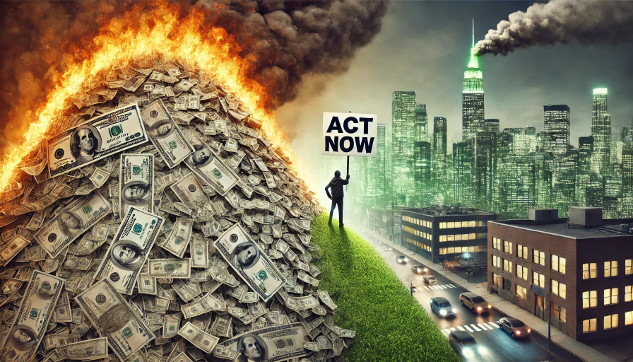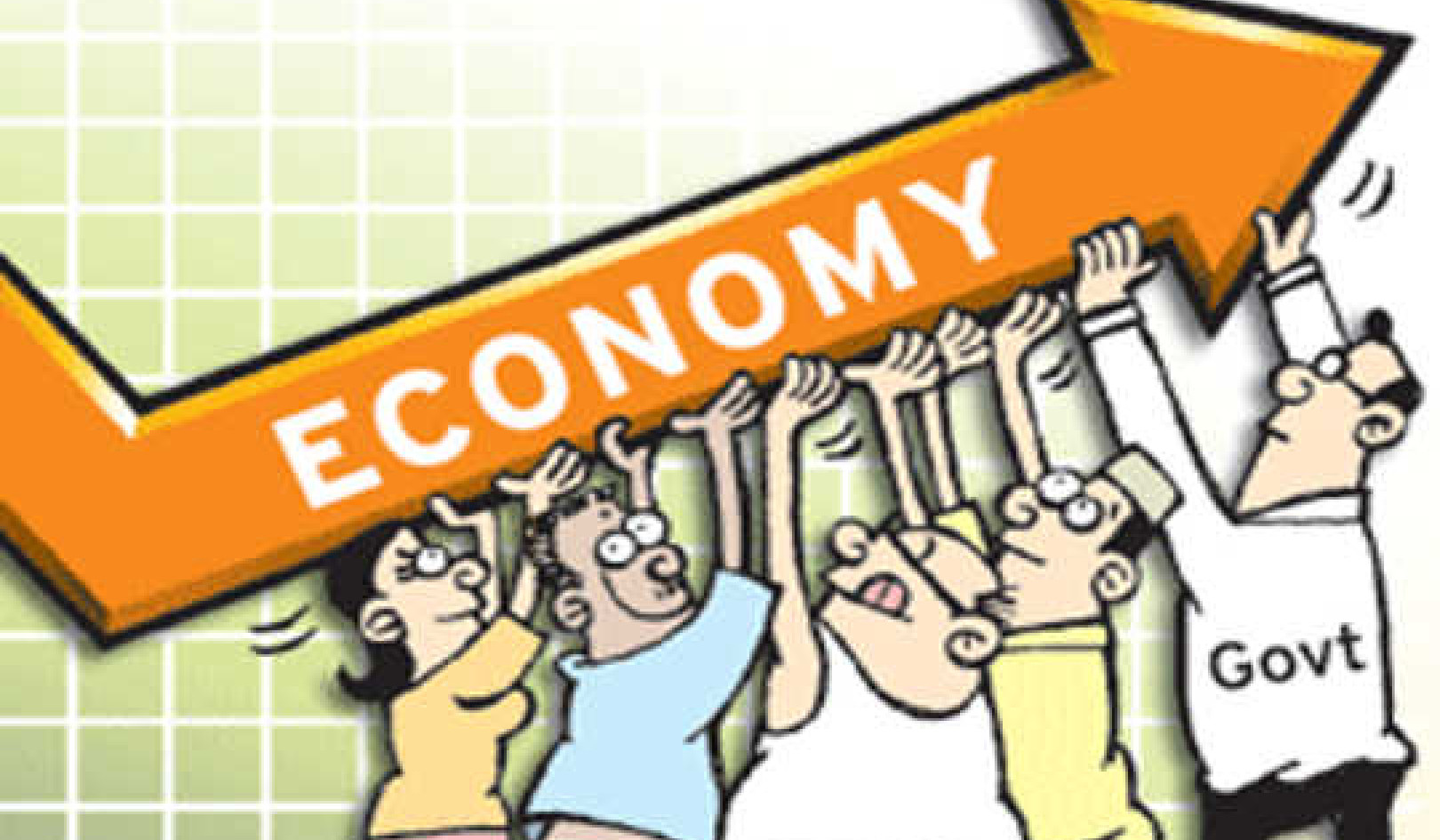
In this Article:
- What is the Fourth Turning, and why does it matter for climate action?
- How does climate change intensify economic and political challenges today?
- Why is climate action essential, even in times of national debt concerns?
- Can taxing the wealthy provide resources for climate resilience?
- How can political reforms break gridlock on climate policies?
Can We Afford to Ignore Climate Action in the Fourth Turning?
by Robert Jennings, InnerSelf.com
Today, as we potentially navigate a 'Fourth Turning', a period historically marked by societal upheaval and significant crises, the urgency of climate action becomes even more pronounced. This next decade could test our society's resilience in ways we haven't experienced in generations. While such periods have led to transformative change, they also risk diverting attention from urgent priorities. We now face the existential threat of climate change, a crisis that cannot afford to be sidelined, even in times of upheaval.
As the need for climate action becomes increasingly urgent, political resistance also grows. Many argue that, with the high national debt, the U.S. can't afford significant spending on climate initiatives. Others suggest that austerity and fiscal conservatism are the only viable paths forward. But is this really true? This article makes the case that targeted taxation on the wealthy, directed toward climate-related investments that boost productivity, isn't just possible — it's essential. Now is the time for bold, strategic action to navigate the Fourth Turning and emerge stronger.
The Political and Economic Barriers to Climate Action in a Crisis
Today's political landscape presents unique challenges to climate action. Those who resist new spending often cite the high level of national debt, and Republicans and moderate Democrats alike argue for fiscal conservatism to avoid "burdening future generations." This resistance makes it difficult to pass significant climate legislation, especially when the government is divided.
In periods of crisis like a Fourth Turning, calls for "sound money" policies and debt reduction often grow louder. The belief that balancing the budget and reducing debt should precede significant investments is deeply ingrained in our political discourse. Yet, conventional approaches like austerity and sweeping budget cuts won't address the urgent threat of climate change. In fact, these strategies can stifle the kinds of investments we need to protect the economy from climate-related disasters. Failing to act risks compounding economic instability and environmental degradation, threatening long-term prosperity.
Why Climate Inaction is Not an Option
The risks of climate inaction in a Fourth Turning scenario are stark. Each year, climate change intensifies, bringing more severe and frequent disasters: stronger hurricanes, uncontrollable wildfires, widespread droughts, and rising sea levels. We're already seeing these events' economic and social tolls, and the effects will only worsen without action.
The idea that we "can't afford" climate spending overlooks the tremendous costs associated with climate-related disasters. In recent years, the U.S. has spent hundreds of billions of dollars in disaster relief, infrastructure repair, and economic support following these events. Each climate-related disaster disrupts communities, damages infrastructure, and strains government resources. These costs are only projected to grow, further aggravating the debt concerns of those who oppose climate spending.
By failing to invest in climate resilience now, we're choosing to pay a higher price later — in both economic costs and human suffering. However, climate action isn't just an environmental necessity; it's essential to preserving financial stability and social cohesion. As the Fourth Turning challenges our institutions and values, addressing climate change is central to ensuring that we emerge more robust and resilient. The potential for a stronger, more resilient economy is within our reach.
Taxing the Wealthy as a Targeted Solution
Given the urgent need for funding, a targeted solution is not just necessary, but also feasible: increased taxation on the wealthiest Americans. History offers a clear precedent: following World War II, the U.S. implemented progressive taxation, which helped fund public goods and support economic growth without undermining prosperity. A similar approach could provide the resources needed for comprehensive climate action today.
Concerns that taxing the wealthy would hurt the economy are mainly unfounded. The spending habits of high-income individuals are concentrated in financial markets, real estate, and luxury assets, which have minimal impact on essential consumer spending or economic growth. Studies consistently show that directing a portion of the wealthiest individuals' resources toward public investment has little to no effect on broader economic activity. In fact, these funds can have a far more significant positive impact when redirected toward productive investments.
Funds raised from taxing the wealthy could be earmarked explicitly for climate-related investments that offer a high return on investment, supporting productivity gains across the economy. This approach doesn't just address climate change; it creates jobs, promotes economic growth, and fosters long-term resilience. By investing in renewable energy, climate-resilient infrastructure, and sustainable agriculture, we can build a future that is not only environmentally sound but also economically strong and socially just.
Strategic Climate Investments that Enhance Productivity
Climate-related investments are often framed solely as expenses but are strategic investments that can boost productivity and resilience. Here are a few key areas where targeted climate spending can create both immediate economic benefits and long-term gains:
Investing in renewable energy like wind, solar, and grid modernization isn't just about reducing carbon emissions. These energy sources can also lower energy costs for households and businesses, create jobs in new technology sectors, and increase energy security. Reducing our dependence on fossil fuels makes our economy less vulnerable to price swings in global oil markets, providing stability for businesses and consumers alike.
Extreme weather events caused by climate change place tremendous strain on our infrastructure. Investing in resilient infrastructure — such as storm-resistant power lines, flood barriers, and heat-resistant road materials — can protect communities from disaster, saving billions in future repair and rebuilding costs. Climate-resilient infrastructure ensures that our roads, bridges, and utilities remain functional, supporting economic activity even in adverse conditions. This kind of investment protects us today and helps avoid the costly cycle of constant rebuilding.
Our food systems and water resources are becoming increasingly vulnerable to climate change. Sustainable agriculture practices, like efficient water management and crop diversification, can make our food supply more resilient to changing weather patterns. By investing in technologies that reduce resource consumption and protect the land, we can ensure food security and conserve water for future generations. These practices support long-term productivity while reducing the environmental impact of agriculture, making them essential components of a sustainable economy.
Each of these investments is more than just a climate measure; it's an economic stimulus that provides returns over time. By investing strategically, we not only create jobs and lower costs but also enhance the resilience of our communities. Through targeted taxation and climate-focused spending, we can address our society's immediate and future needs, setting a foundation for lasting prosperity and a more resilient future.
Why Modern Monetary Theory Isn't a Likely Option
Some advocates propose using Modern Monetary Theory (MMT) to fund climate initiatives without concern for debt. MMT suggests that countries with sovereign currencies, like the U.S., can spend as needed without worrying about deficits as long as inflation remains controlled. However, broad adoption of MMT is politically unlikely, given the deeply rooted resistance to unconventional economic policies and the strong emphasis on debt reduction in policy circles.
More importantly, MMT isn't the only solution. Given today's political realities, a more viable approach is to use targeted taxation on the wealthiest Americans to fund climate investments. By balancing new spending with responsible funding sources, we can address climate change in a politically feasible and economically sound way.
Overcoming Political Gridlock and Building Public Support
Implementing effective climate action requires overcoming the structural obstacles in our political system. Today, significant barriers to progress lie within the framework of our government itself: a Supreme Court increasingly unresponsive to public opinion, a Senate paralyzed by the filibuster, and a political landscape shaped by legalized corruption and gerrymandering. Addressing these issues isn't optional — it's foundational for securing both climate action and democracy itself.
Recent Supreme Court decisions have paved the way for unchecked corporate influence in politics. Rulings like Citizens United opened the floodgates for unlimited spending in elections. At the same time, revelations of conflicts of interest among certain justices raise concerns about impartiality and accountability. Implementing reforms — such as a clear code of ethics, term limits, and transparency requirements for justices — would help restore public trust in the judiciary and ensure that the Court serves the people's interests.
Public support is vital to achieving these reforms. Educating people about how climate action enhances the quality of life, boosts job creation, and lowers costs can generate broad support. With widespread public backing, leaders can feel empowered to pursue reforms in campaign finance, voting rights, and eliminating the filibuster. Public messaging that ties climate investments to economic resilience and individual well-being makes the issue more personal and galvanizes support for broader democratic reforms.
Building Public Support for Climate Action
While structural reforms are necessary to break political gridlock, public support for these changes is equally vital. Many people back climate action but may not fully realize how systemic issues — like money's influence in politics or gerrymandering — stand in the way. By educating the public on these connections, we can build a stronger coalition for both climate initiatives and democratic reforms.
First, connecting the direct benefits of climate action — like job creation, reduced energy costs, and safer communities — to people's everyday lives can build broad support. When individuals understand how climate investments improve their quality of life, they're more likely to back policies and reforms that make those investments possible. Public messaging that frames climate action as essential for economic stability and productivity can also appeal to those who may view environmental issues as secondary concerns.
Second, highlighting strong public support for reforms like taxing the wealthy, voting rights protections, and climate action can encourage lawmakers to prioritize these issues. Polls consistently show that most Americans favor taxing the rich and addressing climate change, providing politicians with a robust mandate to act. By emphasizing these popular sentiments, advocates can counterbalance the influence of special interests and urge politicians to respond to public priorities.
Building a Resilient and Just Future
The challenges we face today are daunting, but they also present a rare opportunity to reshape our institutions, economy, and society for the better. Addressing climate change and other pressing issues will require us to move beyond conventional political gridlock and take bold steps toward reforming our democracy. By taxing the wealthiest Americans, eliminating structural barriers like filibustering, protecting voting rights, and ensuring an accountable judiciary, we can create a government that serves the people's interests.
If we have the courage to act, this fourth turning could be the catalyst for transformative change. By investing in climate action, economic justice, and democratic renewal, we can build a future that is not only resilient but also rooted in fairness and accountability. Let us seize this moment to build a society that truly reflects our values and meets the challenges of our time.
If we are indeed in a Fourth Turning, the stakes for climate action have never been higher. In past periods of upheaval, long-term concerns were often sidelined in favor of immediate needs. Today, we have an opportunity to avoid repeating these mistakes. By taxing the wealthiest individuals and using these funds for strategic climate investments, we can build a resilient economy that benefits everyone.
These investments aren't just environmental protection but a commitment to economic stability, public health, and community resilience. As we face the transformative years of the Fourth Turning, we must choose to invest in a future that reflects our highest values and our most profound responsibilities.
The question isn't whether we can afford climate action — it's whether we can afford to wait.
About the Author
 Robert Jennings is co-publisher of InnerSelf.com with his wife Marie T Russell. He attended the University of Florida, Southern Technical Institute, and the University of Central Florida with studies in real estate, urban development, finance, architectural engineering, and elementary education. He was a member of the US Marine Corps and The US Army having commanded a field artillery battery in Germany. He worked in real estate finance, construction and development for 25 years before starting InnerSelf.com in 1996.
Robert Jennings is co-publisher of InnerSelf.com with his wife Marie T Russell. He attended the University of Florida, Southern Technical Institute, and the University of Central Florida with studies in real estate, urban development, finance, architectural engineering, and elementary education. He was a member of the US Marine Corps and The US Army having commanded a field artillery battery in Germany. He worked in real estate finance, construction and development for 25 years before starting InnerSelf.com in 1996.
InnerSelf is dedicated to sharing information that allows people to make educated and insightful choices in their personal life, for the good of the commons, and for the well-being of the planet. InnerSelf Magazine is in its 30+year of publication in either print (1984-1995) or online as InnerSelf.com. Please support our work.
Creative Commons 4.0
This article is licensed under a Creative Commons Attribution-Share Alike 4.0 License. Attribute the author Robert Jennings, InnerSelf.com. Link back to the article This article originally appeared on InnerSelf.com

Related Books:
The Future We Choose: Surviving the Climate Crisis
by Christiana Figueres and Tom Rivett-Carnac
The authors, who played key roles in the Paris Agreement on climate change, offer insights and strategies for addressing the climate crisis, including individual and collective action.
Click for more info or to order
The Uninhabitable Earth: Life After Warming
by David Wallace-Wells
This book explores the potential consequences of unchecked climate change, including mass extinction, food and water scarcity, and political instability.
Click for more info or to order
The Ministry for the Future: A Novel
by Kim Stanley Robinson
This novel imagines a near-future world grappling with the impacts of climate change and offers a vision for how society might transform to address the crisis.
Click for more info or to order
Under a White Sky: The Nature of the Future
by Elizabeth Kolbert
The author explores the human impact on the natural world, including climate change, and the potential for technological solutions to address environmental challenges.
Click for more info or to order
Drawdown: The Most Comprehensive Plan Ever Proposed to Reverse Global Warming
edited by Paul Hawken
This book presents a comprehensive plan for addressing climate change, including solutions from a range of sectors such as energy, agriculture, and transportation.
Click for more info or to order
Article Recap
The Fourth Turning signals a period of societal upheaval that challenges the prioritization of long-term issues like climate change. This article argues that climate inaction could lead to escalating disasters and economic instability, outlining why investments in renewable energy, resilient infrastructure, and sustainable agriculture are essential. Political and economic barriers, like fiscal conservatism and high national debt, pose challenges, yet strategic taxation on the wealthiest Americans is proposed as a viable funding source. The article emphasizes that climate action is not just an environmental imperative but a crucial economic strategy that can enhance national resilience.































